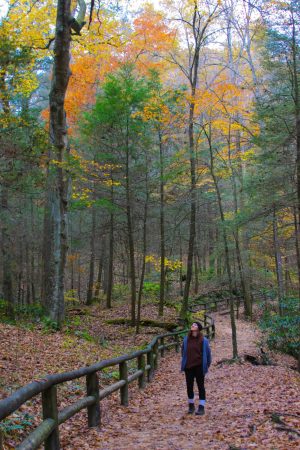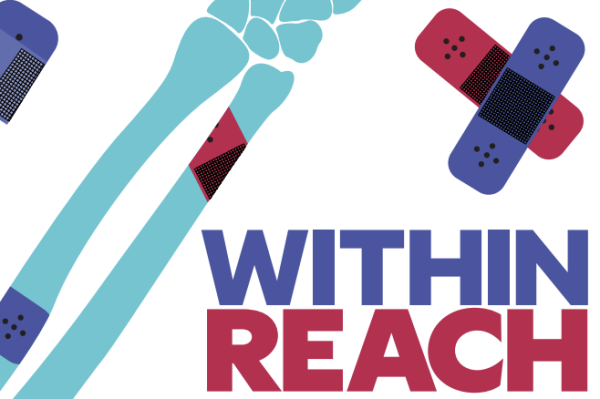Finding Your Footsteps
In a physically and mentally stressful world, time alone in nature is the solution.
This is a story about hiking. We could report on hiking locations, hiking equipment, and the history of hiking, but that’s not what this is about.

No, this story is about us. Being a student, being a teenager, is overwhelming. We are still children, but expected to be adults. Eyes are on us everywhere: social media, parents, teachers. The pressure of constant supervision follows us like a shadow, never letting us catch our breath.
Mental constraints weigh down our minds, and it becomes harder to lighten that weight in such a congested environment. Sprawling cities are filled with incessant noise and relentless motion. The city makes it hard to focus on anything other than the external: homework assignments, phone notifications, and the next deadline.
We spend long hours confined in stuffy buildings, weaving our way through throngs of students switching classes, and riding in unsteady buses, shoulders squeezed together. Outside, back at our homes, responsibilities are placed on our shoulders that prevent us from relaxing even in our supposed safe-spaces.
We need a breather.
Nature is all around us. It skirts every city, pops up in the cracks of asphalt roads, and flows below creaking steel bridges. Despite its presence, it is easy to forget about completely. For some of us, nature can only be seen on the short walks from cars to classrooms and the screensavers of our phones. Preoccupied, we allow nature to fade into the background, short-lived moments of appreciation getting lost amidst our worries. But for many of us, nature is one of the few places where we can find peace of mind.
Methods of relaxation like meditation and music provide an escape from the real world, but perhaps no activity allows people to get in touch with themselves and nature as well as hiking. While it may be physically challenging at times, hiking lets us turn off our overexerted, work-focused minds. Falling into a rhythm, putting one foot in front of the other, we can turn our focus to the beauty both around and inside us.
Packed into dense cities or sprawling neighborhoods, living our lives in stuffed classrooms and cafeterias, there is a whisper in the back of our minds, telling us to get away. At the very least, our brains often ask for a well-deserved break, attempting to hear the music of the forest beyond the noise of a busy street corner. Hiking lets us immerse ourselves in that music; lets us escape from the distractions. It is hard to form connections with others when all we can think about is our individual burdens, isolating ourselves. But hiking alone can allow for a different kind of isolation— one that heals our minds instead of hurting them. Among the birds, bugs, and branches, we can be alone without feeling lonely. Whether it be casually walking around or trekking through difficult terrain, hiking in natural spaces is the perfect way to get some formative alone time.
Solo hiking is exactly that: walking through nature alone.
Getting away from other people makes it possible to individually reflect without the influence of the endlessly busy world. In order to write about solo hiking, we had to break away from that influence and experience it for ourselves.
But first, as writers, we had to acknowledge our different backgrounds. One of us — Norah — grew up hiking: camping trips as a toddler, week-long backpacking for summer camps as a teen, annual road trips across the northern United States and Canada. Hiking was an integral part of Norah’s development, not only physically, but mentally and emotionally as well. Meanwhile, Sam’s entire life in Louisville has been in a dense downtown, with opportunities to get away into nature coming few and far between — the short bouts of mindfulness that accompanied short-loop jogs were often interrupted by sporadic traffic.
Because of this gap between us, we decided we needed to have a shared experience. Some of our trip would be undertaken together, working as a team with our photographer, Jackson, to gather the photos for our story, bolster our own hiking experience, and share our thoughts about the landscape aloud. After all, the story was a team effort.
However, because we had discovered the benefits of solo hiking, we had to find time to break apart. We planned to dedicate time to going solo, to be accompanied by only our own thoughts. Plus, of course, the backdrop of the beautiful forest we would walk through.
Red River Gorge is a nationally recognized natural landmark in Stanton, KY, but more than that, it is a bustling forest full of wildlife. It is a family destination for long-weekend hiking, a spot for friends to hang out away from their jobs and city life. From towering cliffs to low valleys, humans and animals trek through the woods to experience a calm that can be found nowhere else. As part of writing this story, our team of writers and our photographer traveled out to the Natural Bridge, a particularly well-known site in Red River Gorge.
From the top of the Natural Bridge, we saw a sea of red and orange trees turning color with the seasons. A slim line cut through the foliage— a distant highway. From hundreds of feet away, the cars looked like specks of dust, insignificant among the nature that surrounded them. And although other people had come to enjoy the beauty of the Natural Bridge, it was freeing. Our daily stresses could not reach us so high up. We took deep breaths of the crisp air, letting the calm of nature soak in.
We returned home with refreshed minds and a new outlook on being alone.
Solo hiking can create bonds that are only possible in a place of solitude. Not only with nature, but with ourselves— we can enjoy our own company. We are alone, but we can feel and think with more clarity, more freedom. Living in a society that is packed with skyscrapers and highways, we shut out nature and lock ourselves behind doors of responsibilities and stress. Solo hiking can open those doors.
Jacob T. Rex, 24, an avid hiker who spent time solo hiking as a young adult, is no stranger to feeling isolated as he grew busy with school and work.
“Friendships are harder and harder to maintain because you work so much. And school is just overwhelming,” Rex said. He is the graduate assistant and coordinator of the Outdoor Recreation Activities Center (ORAC) at Western Kentucky University (WKU). He spoke fondly of the wilderness. “That’s where we get to just spend time— no distractions, no phones, no work stuff.”
With nothing detracting from the experience, solo hiking is the perfect opportunity to ground ourselves.
However, when thinking about ‘solo hiking,’ one might think: isn’t it dangerous? Tiring? But people choose to go solo despite that, motivated by their own unique reasons, pulled by nature. Sometimes, it is a physical goal— wanting to get healthier or stronger. Others want to complete some epic journey just to say they’ve done it; they are motivated by a bucket list. There are those who desire healing through the forest. Teenagers and young adults sign up for summer camps. Some are specialized hobbyists, like backpackers or birdwatchers. Every person on the trail lives a different life, but we all converge within the forest. We all find our own path, our own footsteps, out in nature.
Of course, the dangers of solo hiking do not disappear because we are passionate about nature. But even with the possible risks, solo hiking is not only rewarding, but life changing. As a 14-year-old, one of Norah hiked along the Shenandoah stretch of the Appalachian Trail (AT) as part of a summer camp in Virginia and had the chance to appreciate nature in its truest form: tranquil and unrestrained. It was a sharp change from the rest of the world, allowing pause and reflection, not only about the wilderness, but about life.
With our parents worrying about our safety and teachers hawking us for homework, it might be difficult for students, for children, to hike alone. But the opportunities of summer camps and other youth groups allow kids to break away from our worries during one of the most stressful periods of life.
Many organizations, like the camp Norah went to, focus solely on kids getting the outdoor experiences they need. Rex works as a youth recreation leader at the Voyageur Outward Bound School, a nonprofit that offers teenagers the opportunity to go out in nature. They can go backpacking, rock climbing, and canoeing with instructors like Rex. He has taken groups of teens and young adults out to trails around the United States, and helps them not only with wilderness skills, but also to cultivate their personal growth through being in nature.
During a backpacking trip to the Boundary Waters in northern Minnesota, Rex led seven teenagers— 16 to 19 years old— along a physical challenge and a mental journey. “I just got to keep asking these really intimate questions like ‘Who do you want to be? What do you want?’” Rex said. “These students would get really frustrated and angry with each other. They’d fight. They’d fight me— you know, as young people, they’re still developing and figuring these things out.”
“I just saw myself in them,” Rex said. After all, he had experienced something very similar when hiking solo a few years ago, and asked himself the same questions.
As young adults tend to do, Rex was wrestling with his identity and mental health. “I really just needed some space to think.”
“I was struggling a lot with self image, body image—particularly my own social life, I had a lot of social anxiety. I was really scared of social situations, and just a lot of really negative thoughts,” Rex said.
Having grown up in the Smoky Mountains in Tennessee, and hiking the Appalachian Trail at 15, Rex is no stranger to the mountains. “Being in those spaces by myself gave me the confidence to really be who I wanted to be, to ask myself, ‘Who is that?’ I could literally look into a lake and be like, ‘Who is this man? What am I looking at? What do I want to be when I walk out of these woods?’”
Rex is only one out of many who have experienced the same.
Solo hikers hit the trails all over the country. From the Pacific Crest Trail along the west coast to the Smoky Mountains of North Carolina and Tennessee, they adventure through different states and unique environments. Going alone is different from day hikes or short visits with friends or family. Solo hikers can experience something entirely different and unique only because they are alone— they become more immersed in nature, and more in tune with themselves. The Appalachian Trail is popular for day-hiking, but it holds deeper meaning for many individuals who have spent months traveling on the trail.
Being alone for that long is often viewed as a negative: boring or sad. But solo hiking can be very much a positive, benefitting both mental and physical health. Our team reinforced the prior knowledge we had about the effects of nature during our trip to Red River Gorge.
As Norah walked along the damp trail at Natural Bridge, she thought of homework, social media, and her long ride home. But as the noise fell away as she went further into the forest, her mind went quiet as well. She listened as the drone of the distant highway disappeared, replaced by the sounds of squirrels rustling and water bubbling. Once Sam slowed his pace and stopped to smell the natural wildlife, he was able to absorb the magic of the outdoors. Any stressors from the city faded away as he focused on the stunning bright lines of trees and the sun scattering from their leaves. Only later did they realize this was a perfect example of the mindfulness we all need; a mental reset.
Once we headed home to gather our thoughts and put pen to paper, we discovered that studies confirm the feelings we got to experience out in the wild. Researchers from the University of Chicago have found that natural environments help improve people’s memory, attentional-control, and cognitive flexibility. Stanford researchers additionally discovered that being outdoors is good for calming short-term anxiety and lowering risks of depression. Various studies have found that just being outside in nature, in any context, beneficially reduces one’s heart rate and blood pressure as well as the amount of stress hormones our bodies produce.
Charissa Hipp, who works in the Visitor Center at Harpers Ferry— the honorary halfpoint along the Appalachian Trail— noted both these aspects when discussing the major benefits that rediscovering outdoor recreation had for her later in life.
“I had what I would call a complete transformation. I lost a lot of weight. I didn’t have any more of the post-partum depression that I was dealing with. I just felt this complete sense of calm when I was out in nature.”
Another component of mental well-being, especially for younger kids, is establishing a sense of community. Outdoor recreation and experiences are perhaps the purest tests of problem-solving and co-operative abilities, forcing students to work together to push through the tests of nature.
As Rex explained his experience with college students, nature allowed the opportunity for vulnerability. “Some of them are getting ready to graduate, and they came out there for a fun time— they came out there literally just to go backpacking. But by the last night, they’re crying, holding each other in a circle, opening up to each other about trauma— about things they’re sensitive about.”
Because of his own experiences and the students he has worked with, Rex knows how much nature can change a person’s life.
“When they came in, and I first met them in the van, I saw a couple of scared kids who were looking for something really important. They didn’t know what. When they left on that bus, I saw some people that were ready to make changes in their lives, and then the lives of the people around them,” Rex said.
At first glance, Louisville seems far away from the beautiful forests of the Appalachian Trail and the stone formations of Red River Gorge. Our city is a crowded place. Highways criss-cross the open fields along Waterfront Park, suburbs continuously expand, and garbage lines the shore of the Ohio River. Prodigious skyscrapers crowd the downtown, casting deep shadows over the trimmed trees that dot the sidewalks. Even in Louisville’s green spaces, development and pavement poke at every corner.
Louisville is home to more than just asphalt streets and skyscrapers, however. Stepping out of the city is the doorway to the beauty that’s always been here: nature. Taking that first step into the wilderness may seem out of reach, but in reality, it only requires a few free hours. Our trip to the Natural Bridge was spontaneous— pitched for the first time to fully planned within a single week. Even with our busy lives, we were able to take that time to truly root ourselves to the world around us. Within the tranquil atmosphere of the forest, people can coexist without any barriers.
Hipp spoke about taking her daughter out to the trails to help with maintenance. “Everyone was very welcoming, even though they all knew each other, and we were guests for the day,” Hipp described.
At the end of the day, all of the people that we spoke with mirrored the sentiments from our own spontaneous trip. Solo hiking, in all of its forms, is a perfect way to decompress from the hustle and bustle of city life and practice the mindfulness and relaxation that we all need in our lives. And as we found out ourselves, planning a trip outdoors to a local or state park is as easy as checking the Internet for the closest trails.
Regardless of whatever type of hiking trip and locale being researched, visitor centers across both Louisville and the U.S. have set up plenty of resources online and in-person to streamline that process. So don’t be afraid to go alone on Kentucky’s gorgeous trails: it’s easier and more rewarding than one might think.
As much as we’d love everyone to head out into nature immediately, it’s critical to understand the responsibilities that come with it. We cannot simply wander off into the forest and make it our own. The forest is a teeming community of wildlife; Red River Gorge boasts at least 1,000 different species of animals and plants. While we may not always see them, we must be aware of their presence and treat it just as we would another person. To respect the trails is to return the gift given to us by nature.
The Appalachian Trail Conservancy often emphasizes the importance of “Leave No Trace.” Leave No Trace has become a necessary rule as more and more people go on hikes and leave items behind. This also applies to affecting what is already present on trails. After all, one of the many animals that call the forest their home might be living on those flowers or bushes.
“Understanding and advocating for Leave No Trace practices is huge. I also think that one of the biggest threats that the trail is facing right now is overuse,” Hipp said.
A hike, by definition, is to take a walk for pleasure or exercise. But it is so much more than that. It can release stress, improve physical and mental health, and it can change lives. On the trail, we experienced this firsthand. With our day-to-day lifestyles being so demanding, hiking is, essentially, a psychological breather. The wilderness lessens the tedious nature of a life filled with schedules and deadlines, and confronts us with the simplicity of isolation, a true isolation instead of the false seclusion that our strenuous lives create. Our minds and bodies are in sync as we move forward, breathing in cooler, cleaner air. When we are out in the woods, we are unrestricted; hiking is open to every race, age, and gender. The trail is tamped down, turned soft under the hundreds of feet that have walked it before us. Being alone on a trail, we’re not as alone as we may seem. In truth, we’re freeing ourselves from the aspects of society that truly make us isolated.
“There’s no other place in the world. You can’t really have that experience except in the outdoors. It’s raw, there’s no rules to it. And it forces you to ask yourself who you want to be,” Rex said.
Donations are collected through The Publishers, duPont Manual High School's booster club for J&C. On The Record relies completely on sponsorships, advertisements, and donations to produce and distribute each issue. Please consider donating to our cause, and helping the student journalists of OTR amplify youth voices for years to come.







